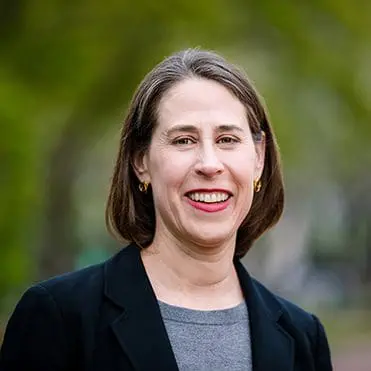
Data can’t make the world more just and equitable for our children, but it tells us where to start working.
Kate leads DQC’s federal policy and advocacy work, identifying and acting upon high-impact federal opportunities that could support or improve the state data ecosystem. Part of her work involves managing the Data Champions Collaborative, a 40-organization effort to reimagine the federal role in supporting state efforts to develop high-quality, accurate, secure and timely data systems that meet the most pressing needs of students, families, and communities today. She guides DQC and the Collaborative in implementing this shared vision for how federal policy can promote improved data systems in a manner that supports innovative work in states that improves students’ educational and career pathways.
Prior to joining DQC, Kate was Vice President of The Institute for College Access and Success (TICAS) and Vice President for Federal Policy at Results for America where her work focused on supporting governments at all levels in using evidence and data to advance economic mobility. Before Results for America, Kate served as the pastoral associate for social justice at Holy Trinity Catholic Church in Washington, DC, and the Director of Legislative Affairs at the Education Trust. Before Ed Trust, Kate practiced law at Drinker Biddle & Reath LLP and Williams & Connolly. She also served as Legislative Counsel to Senator Paul S. Sarbanes (D-MD) and as Legislative and Policy Advisory to Maryland Lt. Governor Kathleen Kennedy Townsend.
Kate holds a juris doctor from Vanderbilt Law School and a bachelor’s degree from Georgetown University. She lives in Washington, DC, with her husband, Dan, and their two daughters.
Why do you do this work? Because having the preparation, education and knowledge to choose whatever life path you want shouldn’t be something you can buy. Currently, generational wealth divides, privilege and a host of things no child can control play an out-weighted role in determining life trajectories. The goal of this work is to change that, and that’s why I do it.
Tell us a data use story that you love. It’s sort of a data story, sort of an equity story: the creation of Seattle/King County’s Best Starts for Kids. When they realized they needed a new early childhood program rather than just creating one from the government out, they started with the community. They had conversations, made sure community voices were represented throughout the process, looked at both the quantitative data about what neighborhoods/communities needed more options and the qualitative data coming from community members. The program they crafted has been wildly successful because it was based in equitable data, both quantitative and qualitative.
What’s your superpower? Workwise, connectivity. I’m not the best at any one thing but I know lots of smart people and I’m not afraid to rely on them and connect them to one another so that the work benefits from collaborative efforts. Outside of work, I’m a pretty decent triathlete and I love the time I get to spend on my bike, in the pool or running and not thinking about data!

